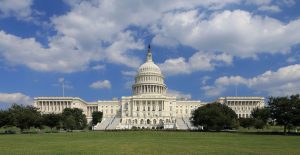Restoring Confidence in the Senate Confirmation Process
We should feel confident that our government leaders are working for us and not for their former employers. Confident that Senate-confirmed nominees have no conflicts of interest that would improperly sway their decision-making. Yet, major loopholes in the laws that protect the integrity of the federal government’s decision-making process have allowed government leaders to abuse their power and circumvent the rules without consequence.
 Congress passed the Ethics in Government Act of 1978, the Procurement Integrity Act, the Honest Leadership and Open Government Act of 2007, the Lobbying Disclosure Act, and the STOCK Act of 2012 to protect government decision-making. Under these laws, all Senate-confirmed nominees fill out financial disclosure reports to ensure no financial conflict of interest will exist during the performance of public duties.
Congress passed the Ethics in Government Act of 1978, the Procurement Integrity Act, the Honest Leadership and Open Government Act of 2007, the Lobbying Disclosure Act, and the STOCK Act of 2012 to protect government decision-making. Under these laws, all Senate-confirmed nominees fill out financial disclosure reports to ensure no financial conflict of interest will exist during the performance of public duties.
However, political nominees who were former lobbyists are able to avoid disclosing who their former clients are and the legislation, policies, or regulations they had aimed to influence. Appointees use loopholes to withhold information from the public during the confirmation process about actual or potential conflicts of interest. For example, former Commerce Secretary Wilbur Ross‘s refusal to divest from his holdings raised concerns about whether he was using his “public service” to further his own financial gain. Additionally, former Defense Secretary James Mattis was not required to disclose that he advised the United Arab Emirates military before joining the Trump administration. This means that Senate nominees aren’t required to show loyalty to the interests of the United States government and can hide their ties to polluting corporations.
But this does not have to happen during the new Biden Administration.
PEER is supporting an effort led by the Project for Government Oversight that was sent to the Senate last week outlining 10 necessary steps needed to restore the public’s faith in government leadership. These steps include:
- Submit the necessary financial disclosures to the Office of Government Ethics and formalize an ethics agreement before any confirmation hearing is held.
- Disclose to the committee all previous paid or unpaid employers or clients from the past two years who may have a financial or material interest in the operations of the agency where they have been appointed to serve.
- Disclose to the committee any work on behalf of foreign governments or parties in the past two years.
- Disclose any “golden parachute” payments made by previous employers.
- Request amended ethics decisions to encompass any potential conflicts identified by disclosures to the committee and not captured in the Office of Government Ethics form 278 or the agency’s ethics agreement.
- Pledge to provide the committee with any ethics decisions that require the nominee to recuse themselves from a particular matter or program.
- Pledge to publicly disclose any meetings in which former employers or clients were present, other than widely attended events.
- Pledge to publicly release all waivers and recusals in a timely manner.
- Pledge to be recused from matters that impact the material interests of any spouse’s clients or employers.
- Pledge to not interfere with or politicize the Freedom of Information Act process.
Many of these reforms could be achieved immediately by executive order, but these reforms should become a permanent part of the legislative process.
The Senate has significant power to scrutinize potential conflicts of interest of presidential nominees. At PEER, we will be working hard to make sure the Senate uses this power to make sure that political appointees are working for the American people and not their former employers.
 Monica Mercola is PEER’s Legal Fellow.
Monica Mercola is PEER’s Legal Fellow.